

Xi Jinping, the newly elected Party chief, also said in his first public speech after the congress that the Party must solve problems such as corruption and bureaucracy.
These high-profile remarks against graft have received widespread attention from the public, as well as Chinese and foreign media organizations.
To better hear from the professionals, the new anti-graft chief, Wang Qishan, held a seminar on Nov 30 to seek anti-graft suggestions from eight experts.
China Daily talked with all eight experts, and five of them offered their opinions and insight into China's anti-graft undertakings.
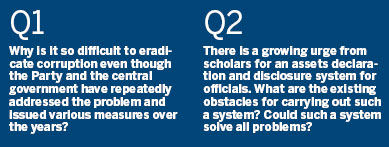 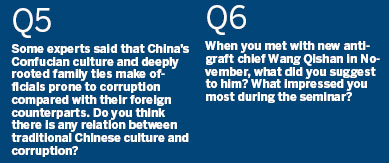 |
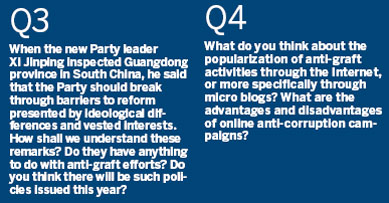 |
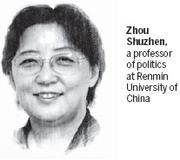 |
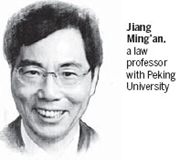 |
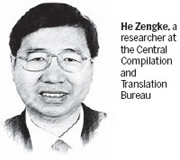 |
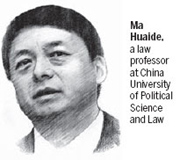 |
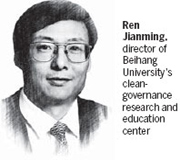 |
|
A1 Anti-corruption has been an important task for Chinese administrators for thousands of years. In the past, many emperors didn't have the determination to dismiss their trusted high-ranking officials, so it was impossible for them to eradicate corruption. The central government must have the courage and determination to better manage high-level officials. If senior officials can set an example of abiding by the law, the lower-ranking officials will follow suit. |
A1 Corruption is a tough and chronic disease in society, which is generated by complex issues: political, economic, and cultural. A2 The ruling Party should clear the way for a policy to make the details of officials' assets public. It's difficult to supervise the officials' family assets because they might deposit their money under their relatives' names, transfer the assets to overseas banks and so on. Many officials are afraid that publicizing their assets may trigger public anger. A3 The income gap between different industries has been widening in recent years. Those who work for monopoly industries such as electricity, tobacco and banks have seen their income rise. Such inequality of income distribution should be addressed because unfairness can lead to social unrest. A4 The Internet is a powerful weapon controlled by the public. Even though it might harm innocent people when misused, it has exposed a lot of corrupt officials. As a form of media, the Internet should go hand in hand with the traditional news media, such as newspapers, to boost transparency. We can diminish the negative side effects of the Internet by passing laws. The people's congress at all levels should also play a role in supervising officials. A5 There are a large number of officials whose spouses, children, secretaries and drivers were found to be involved in corruption. That some officials' family members have become part of corruption has caused great harm to society. This also makes it difficult for the supervision agencies to collect evidence. China has traditional ideas, such as being loyal and righteous, which to some extent informs the relationship between the corrupt officials and their staff. |
A1 The way the Chinese government fights corruption needs improvement. The current anti-corruption efforts are based on a kind of "selection", which means they choose someone to be investigated and stop the investigation if higher-level authorities are involved. It is high time for China to establish legal safeguards against corruption. A2 We cannot say the system to have officials declare their property will stop corruption, but it can contribute to alleviating the problem. If the system can be well implemented, the anti-corruption work will yield twice the results with half the effort. We currently have some ideas about the declaration, such as an officials' information network across the country and real-name registration of estate property, but our plan lacks an enforcement schedule. If these ideas are just discussed among officials without the public's supervision and participation, the declaration will face difficulties. A3 Sectors with high salaries and the welfare sector are short on supervision and are easily corrupted. Vested interests may occur in some public service occupations such as the medical and health sectors and in State enterprises. A4 I strongly support the online anti-corruption efforts. The Internet provides a new platform for residents to express themselves and participate in public policy, and serves as a good channel to stop corruption. Although online chat may lead to slander, it still does more good than harm. A5 It is too simple to say some countries' cultures are good or bad, and it is not right to define East Asian culture, or Confucianism, as easily corrupted. Confucianism indeed has some old ideas that may harm efforts to stamp out corruption, which needs to change. Cultures must be updated and develop with society. A6 I believe that the new leadership will have their way to fight corruption. My suggestion to Wang Qishan was to develop the officials' property declaration system into a law as soon as possible. |
A1 The reason corruption cannot be eradicated may lie in a lack of laws. We have not yet developed laws to stop corruption and regulate anti-corruption work. Campaign-based anti-graft efforts are not enough. Instead, the solution to the problem lies in legislation and its implementation. A2 I think the officials' property declaration system can stop corruption to some extent, because it is in accordance with public opinion and also successful in many foreign countries. If all officials disclose the details of property owned by their family, cases such as the one in Guangdong province where officials hid properties will not happen. The property declaration system should be turned into a law so it has a legal reference point. A3 The current administrative and economic systems are liable to fall victim to vested interests, and concentrated power in some sectors may lead to corruption. But it does not mean vested interests will definitely lead to corruption. If we have a better supervision and information disclosure system, the problem will be alleviated. A4 We should pay more attention to new ways to fight corruption, such as the Internet and new media. Fighting corruption not only requires public participation but also demands advanced technology. If online anti-corruption is used in a sensible way and supported by prosecuting authorities, it will continue to contribute to clean governance. A5 I don't think there is any relationship between traditional Chinese culture and corruption, and it is not necessary to put the two together. In the past, China had clean governance, so we cannot say corruption is caused or affected by a culture of Confucianism. If a country has good supervision systems, corruption will be greatly curbed. A6 I feel the new leaders are paying more attention to anti-corruption and have some new ideas. My suggestion to Wang Qishan was to gather together social power and make use of it to supervise officials' corruption instead of inviting several supervisors to help disciplinary authorities do the job. Every citizen has the right to be informed and supervise, so we should give the public the chance to report the problems effectively and in a timely manner. |
A1 Corruption in China is not a superficial problem - we need to reform our anti-corruption system. In the existing system, it is difficult and ineffective to control corruption, even though our new leadership has shown great determination. It is like a car that has an engine, but it lacks other equipment, such as brakes. In the past, corruption was rife in Hong Kong, but it was alleviated after the establishment of the Hong Kong Independent Commission Against Corruption, which can be considered a systematic change. Can our disciplinary departments independently deal with corruption cases? If authorities cannot be supervised effectively, corruption will be there. A2 The biggest stumbling block before the officials' property declaration system is that the authorities' power cannot be effectively supervised. If the declaration is based on a compulsory rule instead of relying on policymakers, it will develop well. The declaration should be an order, not a requirement that depends on the willingness of officials. The declaration system cannot solve all the problems. Take South Korea as an example. The country enforced declaration in 1993, but it still has corruption. A3 There is some relation between vested interests and corruption, which often happens in sectors with concentrated powers such as the State-owned enterprises. Now most authorities and departments have the power to examine and approve spending, which can bring additional or illegal income to officials or senior staff. Yes, we need reform, but how to reform and the timing of reform is more important. In my opinion, it is the right time to push forward political reform, and then we can pay attention to detailed measures. A4 The value of online anti-corruption comes from the advantages of the Internet. It provides a space for residents to participate and can also turn public opinion into pressure on officials and authorities. But it also has disadvantages. It prefers to publish cases in which officials have problems in their personal lives. We cannot depend on the Internet to expose corruption, it is only a tool to gather information and supervise officials. A5 I know someone said the so-called "relation" and "face" issues in East Asian cultures may lead to corruption, but we should take note that other areas with a similar culture, including Hong Kong and Singapore, have made achievements toward stamping out corruption. We cannot lose confidence. A6 At the conference, I shared three suggestions. The first is to build up an anti-corruption consensus and then specify several measures in detail. Second, we should learn from the experience in Hong Kong and Singapore. The final piece of advice is to establish some clean governance special zones, like special economic zones. The most impressive thing for me during the discussion with Wang Qishan, was the change of the conference style. We had interaction instead of a long talk from one official as happened in the past. |